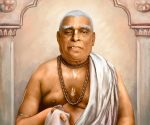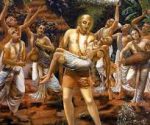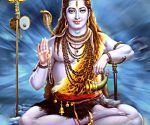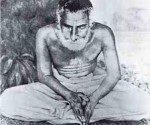Lord Vāmanadeva, the Dwarf Incarnation
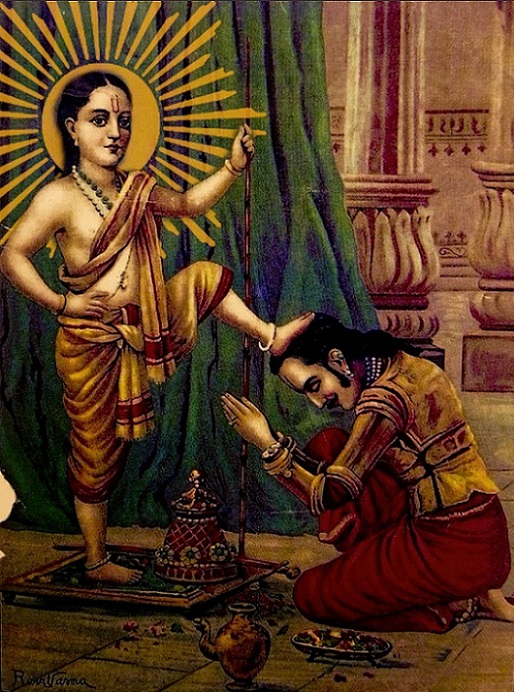 Lord Vāmanadeva appeared in this world from the womb of Aditi completely equipped with conchshell, disc, club and lotus. His bodily hue was blackish, and He was dressed in yellow garments. Lord Viṣṇu appeared at an auspicious moment on Śravaṇa-dvādaśī when the Abhijit star had arisen. At that time, in all the three worlds (including the higher planetary system, outer space and this earth), all the demigods, the cows, the brāhmaṇas and even the seasons were happy because of God’s appearance.
Lord Vāmanadeva appeared in this world from the womb of Aditi completely equipped with conchshell, disc, club and lotus. His bodily hue was blackish, and He was dressed in yellow garments. Lord Viṣṇu appeared at an auspicious moment on Śravaṇa-dvādaśī when the Abhijit star had arisen. At that time, in all the three worlds (including the higher planetary system, outer space and this earth), all the demigods, the cows, the brāhmaṇas and even the seasons were happy because of God’s appearance.
Therefore this auspicious day is called Vijayā. When the Supreme Personality of Godhead, who has a sac-cid-ānanda body, appeared as the son of Kaśyapa and Aditi, both of His parents were very astonished. After His appearance, the Lord assumed the form of a dwarf (Vāmana). All the great sages expressed their jubilation, and with Kaśyapa Muni before them they performed the birthday ceremony of Lord Vāmana. At the time of Lord Vāmanadeva’s sacred thread ceremony, He was honored by the sun-god, Bṛhaspati, the goddess presiding over the planet earth, the deity of the heavenly planets, His mother, Lord Brahmā, Kuvera, the seven ṛṣis and others.
Lord Vāmanadeva then visited the sacrificial arena on the northern side of the Narmadā River, at the field known as Bhṛgukaccha, where brāhmaṇas of the Bhṛgu dynasty were performing yajñas. Wearing a belt made of muñja straw, an upper garment of deerskin and a sacred thread and carrying in His hands a daṇḍa, an umbrella and a waterpot (kamaṇḍalu), Lord Vāmanadeva appeared in the sacrificial arena of Mahārāja Bali. Because of His transcendentally effulgent presence, all the priests were diminished in their prowess, and thus they all stood from their seats and offered prayers to Lord Vāmanadeva. Even Lord Śiva accepts on his head the Ganges water generated from the toe of Lord Vāmanadeva.
Therefore, after washing the Lord’s feet, Bali Mahārāja immediately accepted the water from the Lord’s feet on his head and felt that he and his predecessors had certainly been glorified. Then Bali Mahārāja inquired of Lord Vāmanadeva’s welfare and requested the Lord to ask him for money, jewels or anything He might desire.
When Bali Mahārāja, thinking Vāmanadeva to be the son of a brāhmaṇa, told Him to ask for anything He liked, Lord Vāmanadeva praised Hiraṇyakaśipu and Hiraṇyākṣa for their heroic activities, and after thus praising the family in which Bali Mahārāja had been born, He begged the King for three paces of land.
Bali Mahārāja agreed to give this land in charity, since this was very insignificant, but Śukrācārya, who could understand that Vāmanadeva was Viṣṇu, the friend of the demigods, forbade Bali Mahārāja to give this land. Śukrācārya advised Bali Mahārāja to withdraw his promise. He explained that in subduing others, in joking, in responding to danger, in acting for the welfare of others, and so on, one could refuse to fulfill one’s promise, and there would be no fault. By this philosophy, Śukrācārya tried to dissuade Bali Mahārāja from giving land to Lord Vāmanadeva.
After hearing the instructive advice of Śukrācārya, Bali Mahārāja became contemplative. Because it is the duty of a householder to maintain the principles of religion, economic development and sense gratification, Bali Mahārāja thought it improper to withdraw his promise to the brahmacārī.
To lie or fail to honor a promise given to a brahmacārī is never proper, for lying is the most sinful activity. Everyone should be afraid of the sinful reactions to lying, for mother earth cannot even bear the weight of a sinful liar.
The spreading of a kingdom or empire is temporary; if there is no benefit for the general public, such expansion has no value. Previously, all the great kings and emperors expanded their kingdoms with a regard for the welfare of the people in general. Indeed, while engaged in such activities for the benefit of the general public, eminent men sometimes even sacrificed their lives.
It is said that one who is glorious in his activities is always living and never dies. Therefore, fame should be the aim of life, and even if one becomes poverty-stricken for the sake of a good reputation, that is not a loss. Bali Mahārāja thought that even if this brahmacārī, Vāmanadeva, were Lord Viṣṇu, if the Lord accepted his charity and then again arrested him, Bali Mahārāja would not envy Him. Considering all these points, Bali Mahārāja finally gave in charity everything he possessed.
Lord Vāmanadeva then immediately extended Himself into a universal body. By the mercy of Lord Vāmanadeva, Bali Mahārāja could see that the Lord is all-pervading and that everything rests in His body. Bali Mahārāja could see Lord Vāmanadeva as the Supreme Viṣṇu, wearing a helmet, yellow garments, the mark of Śrīvatsa, the Kaustubha jewel, a flower garland, and ornaments decorating His entire body. The Lord gradually covered the entire surface of the world, and by extending His body He covered the entire sky. With His hands He covered all directions, and with His second footstep He covered the entire upper planetary system. Therefore there was no vacant place where He could take His third footstep.
With the second step the Supreme Personality of Godhead reached the topmost planet of the universe, Brahmaloka, which He diminished in beauty by the effulgence of His toenails. Thus Lord Brahmā, accompanied by great sages like Marīci and the predominating deities of all the higher planets, offered humble prayers and worship to the Lord. They washed the Lord’s feet and worshiped Him with all paraphernalia. Ṛkṣarāja, Jāmbavān, played his bugle to vibrate the glories of the Lord. When Bali Mahārāja was deprived of all his possessions, the demons were very angry. Although Bali Mahārāja warned them not to do so, they took up weapons against Lord Viṣṇu.
All of them were defeated, however, by Lord Viṣṇu’s eternal associates, and, in accordance with Bali Mahārāja’s order, they all entered the lower planets of the universe. Understanding Lord Viṣṇu’s purpose, Garuḍa, the carrier of Lord Viṣṇu, immediately arrested Bali Mahārāja with the ropes of Varuṇa. When Bali Mahārāja was thus reduced to a helpless position, Lord Viṣṇu asked him for the third step of land. Because Lord Viṣṇu appreciated Bali Mahārāja’s determination and integrity, when Bali Mahārāja was unable to fulfill his promise, Lord Viṣṇu ascertained that the place for him would be the planet Sutala, which is better than the planets of heaven.
Bali Mahārāja was extremely truthful. Being unable to keep his promise, he was very much afraid, for he knew that one who has deviated from truthfulness is insignificant in the eyes of society. An exalted person can suffer the consequences of hellish life, but he is very much afraid of being defamed for deviation from the truth. Bali Mahārāja agreed with great pleasure to accept the punishment awarded him by the Supreme Personality of Godhead.
In Bali Mahārāja’s dynasty there were many asuras who because of their enmity toward Viṣṇu had achieved a destination more exalted than that of many mystic yogīs. Bali Mahārāja specifically remembered the determination of Prahlāda Mahārāja in devotional service. Considering all these points, he decided to give his head in charity as the place for Viṣṇu’s third step.
Bali Mahārāja also considered how great personalities give up their family relationships and material possessions to satisfy the Supreme Personality of Godhead. Indeed, they sometimes even sacrifice their lives for the satisfaction of the Lord, just to become His personal servants. Accordingly, by following in the footsteps of previous ācāryas and devotees, Bali Mahārāja perceived himself successful.
While Bali Mahārāja, having been arrested by the ropes of Varuṇa, was offering prayers to the Lord, his grandfather Prahlāda Mahārāja appeared there and described how the Supreme Personality of Godhead had delivered Bali Mahārāja by taking his possessions in a tricky way. While Prahlāda Mahārāja was present, Lord Brahmā and Bali’s wife, Vindhyāvali, described the supremacy of the Supreme Lord.
Since Bali Mahārāja had given everything to the Lord, they prayed for his release. The Lord then described how a nondevotee’s possession of wealth is a danger whereas a devotee’s opulence is a benediction from the Lord. Then, being pleased with Bali Mahārāja, the Supreme Lord offered His disc to protect Bali Mahārāja and promised to remain with him.
From Srimad Bhagavatam




